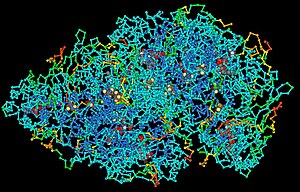This article needs additional citations for verification. (September 2024) |

A macromolecule is a very large molecule important to biological processes, such as a protein or nucleic acid. It is composed of thousands of covalently bonded atoms. Many macromolecules are polymers of smaller molecules called monomers. The most common macromolecules in biochemistry are biopolymers (nucleic acids, proteins, and carbohydrates) and large non-polymeric molecules such as lipids, nanogels and macrocycles.[1] Synthetic fibers and experimental materials such as carbon nanotubes[2][3] are also examples of macromolecules.
- ^ Stryer L, Berg JM, Tymoczko JL (2002). Biochemistry (5th ed.). San Francisco: W.H. Freeman. ISBN 978-0-7167-4955-4.
- ^ Life cycle of a plastic product Archived 2010-03-17 at the Wayback Machine. Americanchemistry.com. Retrieved on 2011-07-01.
- ^ Gullapalli, S.; Wong, M.S. (2011). "Nanotechnology: A Guide to Nano-Objects" (PDF). Chemical Engineering Progress. 107 (5): 28–32. Archived from the original (PDF) on 2012-08-13. Retrieved 2015-06-28.